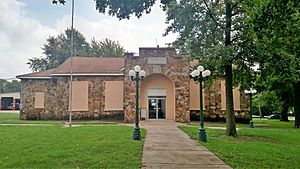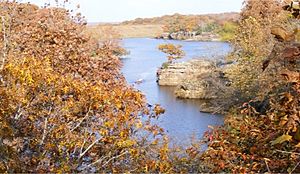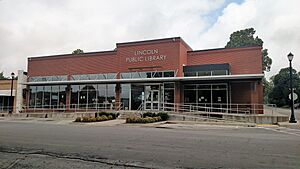Lincoln, Arkansas facts for kids
Quick facts for kids
Lincoln, Arkansas
|
|
|---|---|
|
City
|
|

Lincoln City Square
|
|
| Nickname(s):
Apple Capital of Arkansas
|
|

Location of Lincoln in Washington County, Arkansas.
|
|
| Country | United States |
| State | Arkansas |
| County | Washington |
| Incorporated city | November 23, 1907 |
| Named for | Abraham Lincoln |
| Government | |
| • Type | Mayor-council |
| Area | |
| • City | 2.89 sq mi (7.49 km2) |
| • Land | 2.87 sq mi (7.42 km2) |
| • Water | 0.03 sq mi (0.07 km2) |
| Elevation | 1,453 ft (443 m) |
| Population
(2020)
|
|
| • City | 2,294 |
| • Density | 800.42/sq mi (309.05/km2) |
| • Metro | 534,904 |
| Time zone | UTC−6 (Central (CST)) |
| • Summer (DST) | UTC−5 (CDT) |
| ZIP code |
72744
|
| Area code | 479 |
| FIPS code | 05-39970 |
| GNIS feature ID | 2404930 |
| Website | www.lincolnarkansas.com |
| NWA metro population as of 2019 | |
Lincoln is a city in Washington County, Arkansas, United States. The population was 2,294 at the 2020 census. It is part of the Northwest Arkansas metro area.
Contents
History
Establishment
The area around Lincoln first saw white settlement in the late 1820s. It was first known as Blackjack after the blackjack oaks used to build the first schoolhouse. Joseph Carter built the first store in the area in 1874, still known as Blackjack. A nearby community on Beaty Mountain known as Mt. Hayes was settled in 1877. Starr Hill Township was also organized in the area during this period. The settlements drifted together and continued to grow until applying for a post office in 1884 within Carter's store under the name Georgetown. The name was rejected; the postal service not wanting to duplicate Georgetown in White County, Arkansas (or Georgetown, Madison County, Arkansas). Carter submitted Lincoln as the new name. He said he chose the name seemingly at random, having "seen it on a box", but others were skeptical that Carter had wanted to name the community for Abraham Lincoln all along, as he was a "Republican from the North". Local acceptance for the name Lincoln was slow during the Reconstruction era following the bitter Civil War.
The settlement remained unincorporated until the St. Louis–San Francisco Railway (commonly called the Frisco) planned a branch line (the Ozark and Cherokee Central Railway [O&CC]) between Fayetteville and Oklahoma. The right-of-way acquisition process brought a railroad agent through town, and he platted a town on 22 acres (8.9 ha) south of the proposed railroad in 1903, but modified the plat in 1907. Following this plat, the city of Lincoln was incorporated on November 23, 1907.
Geography
According to the United States Census Bureau, the city has a total area of 2.87 square miles (7.4 km2).
Lincoln is about 25 miles southwest of Fayetteville and approximately eight miles east of the Arkansas-Oklahoma border.
Protected areas
Lincoln Lake, a few miles north of the city, is a 400-acre (160 ha) park surrounding the 90-acre (36 ha) municipally-owned lake formerly used for water supply. The park offers 8 miles (13 km) of hiking and mountain biking trails, fishing, and non-motorized boating.
Region
The Northwest Arkansas region consists of three Arkansas counties: Benton, Madison, and Washington. The area had a population of 347,045 at the 2000 census which had increased to 463,204 by the 2010 Census (an increase of 33.47 percent). The region does not consist of the usual principal-city-with-suburbs morphology. The principal cities retain individual identities, but have grown together along Interstate 49 (I-49). For more than the last decade, Northwest Arkansas has been one of the fastest-growing regions in the United States.
Demographics
| Historical population | |||
|---|---|---|---|
| Census | Pop. | %± | |
| 1910 | 292 | — | |
| 1920 | 534 | 82.9% | |
| 1930 | 687 | 28.7% | |
| 1940 | 720 | 4.8% | |
| 1950 | 771 | 7.1% | |
| 1960 | 820 | 6.4% | |
| 1970 | 1,023 | 24.8% | |
| 1980 | 1,422 | 39.0% | |
| 1990 | 1,460 | 2.7% | |
| 2000 | 1,752 | 20.0% | |
| 2010 | 2,249 | 28.4% | |
| 2020 | 2,294 | 2.0% | |
| U.S. Decennial Census | |||
Human resources
Education
Primary and secondary education
The community is served by the Lincoln Consolidated School District. Successful completion of the curriculum leads to graduation from Lincoln High School. The high school and athletics complex were built in 2012 for $16.2 million. The district briefly operated a district conversion charter school known as the Lincoln Academic Center of Excellence until 2012.
Higher education
Lincoln does not contain any higher education institutions, but is in proximity to the University of Arkansas in Fayetteville and Northwest Arkansas Community College Washington County Campus in Springdale.
Library
Lincoln Public Library was demolished and rebuilt thanks to a bond, grants, and in-kind services. It is 10,200+ square feet, features 108 computers, tablets, and laptops. The public library has two meetings rooms, a demonstration kitchen, genealogy section and free internet extending into the square. The library is a member of the Washington County Library System.
Culture
Lincoln is home to the Arkansas Country Doctor Museum, which includes a collection of medical instruments and personal artifacts from the 1930s to 1980s.
Annual cultural events
The Lincoln Riding Club has hosted an annual rodeo since 1953. The three-day event begins with a parade and typically includes bull riding, calf roping, barrel racing, steer wrestling, a beauty pageant, and a street dance.
Lincoln is home to the Arkansas Apple Festival, held annually since 1976 during the first weekend of October. Echoing the former prominence of apple growing in the Lincoln vicinity, vendors offer food, arts and crafts of the Ozarks for visitors in downtown Lincoln.
Local Apple farmers developed the following in the Area.
- Collins' Red (aka Collins, Champion Red, Champion, Reagan's Red)—found by chance in a field near Lincoln; commercially propagated around 1886; a good colored fruit which keeps well, if kept properly
- Howard Sweet—the seedling is thought to have come from Earls Holt's Cane Hill nursery after the Civil War; grown near Cincinnati, Arkansas by Mr. Howard; a sweet, highly colored dessert apple; the tree has a heavy bloom
- Oliver Red (aka Oliver, Senator)—originated in Washington County; a yellow-skinned fruit washed with bright red; harvested in early September; a good dessert apple
Transportation
As of 2023, there is no fixed route transit service in Lincoln. Ozark Regional Transit operates demand-response service in the city. The nearest intercity bus service is provided by Jefferson Lines in nearby Fayetteville.
In Film
The film Minari, a semi-autobiographical take on film director Lee Isaac Chung's upbringing, is set in Lincoln. Originally filmed on a ranch near Tulsa Oklahoma, the film follows a family of South Korean immigrants who try to make it in the rural United States during the 1980s.
Notable people
- Lee Isaac Chung is an American film director and screenwriter. His debut feature Munyurangabo (2007) was an Official Selection at the 2007 Cannes Film Festival.
- Ryan Mallett, former National Football League and Arkansas Razorbacks quarterback, attended elementary school at Lincoln Consolidated School District, where his father Jim was a coach, and his mother Debbie was a teacher.
See also
 In Spanish: Lincoln (Arkansas) para niños
In Spanish: Lincoln (Arkansas) para niños



